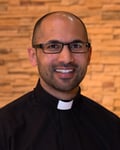Fr. Simon's letter on Residential Schools
June 4, 2021
Dear Parishioners,
Last week, we learned the devastating news that the graves of 215 children were discovered at a residential school in Kamloops, B.C. I addressed this in my homily this past weekend, and I am following up with this letter, knowing that my words will be woefully inadequate. When I first heard the news, I was praying in our chapel at Saint Benedict, on the verge of tears, filled with sadness at the death of so many children. Given my ignorance of this topic, I have been since researching and trying to understand it more deeply.
From 2008-2015, a Truth and Reconciliation Commission (TRC) attempted to document the history of the ‘Indian Residential Schools’ (IRS), and created space for survivors to share their stories. The federal government established and funded these schools with the intention of assimilating Indigenous children into Canadian culture. These children, aged 4-15, were forcibly taken from their homes, restricted from seeing their families, speaking their language, and living their cultural traditions. This network of boarding schools lasted about 120 years; the last school was closed in 1996! Approximately 150,000 children attended these schools, which were mostly located in Western Canada, though there was one in Shubenacadie, N.S. It was estimated that 3,200 children died in residential schools - though some estimates are as high as 6,000 - from disease, neglect, accident, and various kinds of abuse. Of the 70,000 former IRS students still living, there were 31,970 sexual or serious sexual assault cases. All of these numbers have a generational impact, leading to higher rates of addiction, abuse, violence, physical and mental illness, and death. In summary, the ongoing negative impact of the IRS cannot be overstated.
Though the Canadian government initiated this policy of assimilation, these schools were administered by various Christian denominations. There were over 130 IRS, and the Catholic Church was responsible for almost 70% of them. Without question, Catholics who should have been acting in the name of Jesus committed grave sins and perpetrated crimes that inflicted profound wounds on countless Indigenous children and, as a result, families.
As a representative of the Catholic Church, I beg forgiveness for all of the pain and suffering - and even death - that we, as a Church, are responsible for. All of the hurts from the IRS impact Indigenous people directly, and they are a source of scandal for all Catholic believers.
I would like to address a question that I have heard: “Why won’t the Catholic Church apologize for her part in the residential schools?” There have been a few Catholic bishops and leaders of religious communities who have offered apologies over the years, which date back as early as 1991.
In 2009, Pope Benedict XVI invited Chief Fontaine (then the National Chief of the Assembly of First Nations) and a delegation to visit him at the Vatican, in order to bring about reconciliation and healing for the Church’s role in IRS. Afterwards, Pope Benedict released a statement expressing his sorrow, anguish, sympathy, and prayerful solidarity.
In Canada, Archbishop J. Michael Miller of Vancouver offered an apology before the TRC in 2013:
“I wish to apologize sincerely and profoundly to the survivors and their families, as well as to all those subsequently affected, for the anguish caused by the deplorable conduct of those Catholics who perpetrated mistreatment of any kind in these residential schools.”
This past week, he added to that apology: “The Church was unquestionably wrong in implementing a government colonialist policy which resulted in devastation for children, families, and communities.”
I am reminded of the question that Peter asks of Jesus in the Gospels: “How often should I forgive?” Jesus responds by saying 70 times 7 (Matthew 18:21-22). In the Bible, the number 7 was the number of completion. Jesus was saying we must forgive until it is complete. In this situation, I believe we must apologize and make amends - until it is complete.
Once again, I would like to quote Archbishop Miller, who said:
“The pain that such news causes reminds us of our ongoing need to bring light to every tragic situation that occurred in residential schools run by the Church. The passage of time does not erase the suffering that touches the Indigenous communities affected, and we pledge to do whatever we can to heal that suffering.”
So what can we at Saint Benedict Parish do to bring about healing? I willoffer three suggestions. Firstly, as a parish, we are going to donate this year’s Ash Wednesday Social Justice collection, a total of $4,000, to a First Nations cause. You might wish to make a donation to a First Nation cause of your choice.
Secondly, I am available to meet with any Indigenous persons who would like to share their experiences. I will simply try to listen. Please contact the office if you would like to arrange a time to meet ([email protected]). If you know of people who are struggling because of this news, you could make time to listen to and love them.
Finally, I ask that we all join in praying for the intercession of St. Kateri Tekakwitha, an Algonquin-Mohawk who lived on the south shore of the St. Lawrence River in the 16th century and who was canonized by Pope Benedict XVI in 2012. In spite of the incredible suffering she faced in her own life, she displayed heroic virtue. May her prayers lead to genuine truth, reconciliation, and healing.
In Christ,
Father Simon Lobo, CC
